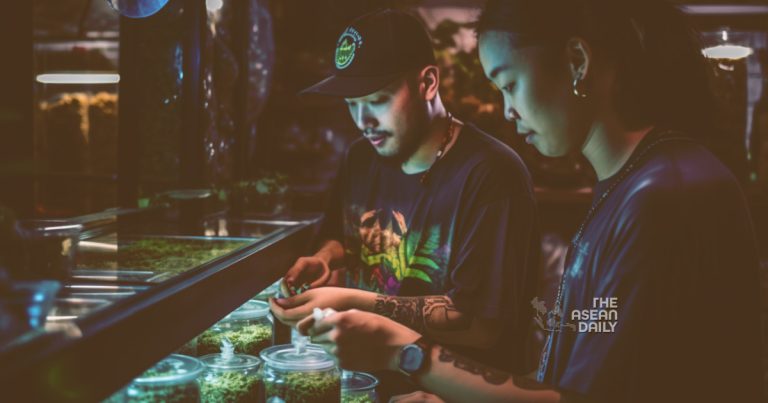28-8-2023 (BANGKOK) In the bustling streets of Bangkok, the proliferation of cannabis dispensaries targeting tourists has become impossible to ignore, ever since the Thai government decriminalized the drug in 2022. Many of these establishments exploit lenient regulations to openly peddle dried cannabis flowers imported illicitly from Canada or the United States. A recent visit to one such store revealed enticing offerings with strains sporting names like “Ice Cream Cake” and “Lemon Cookies,” all touted as “California’s finest.”
However, industry experts predict that these dispensaries may soon face dire challenges due to increased competition, oversupply issues, and the anticipation of new regulations governing cannabis cultivation and sales. These factors are prompting investors to pour millions of dollars into cutting-edge indoor cannabis farms across Thailand.
While the specifics of Thailand’s forthcoming regulations remain uncertain under the newly elected leadership, experts believe that the rules will likely offer investors greater clarity and establish higher barriers to market entry, favoring businesses with robust domestic supply chains.
“Smart money’s going to come in,” remarked Mr. Sirasit Praneenij, co-CEO of the cannabis farming company Medicana, during a recent visit to their advanced indoor cannabis farm on the outskirts of Bangkok. He highlighted the investment in state-of-the-art facilities equipped with LED lights, advanced watering systems, and rows of thriving cannabis plants. Medicana, with a $2 million facility, produces 25kg to 27kg of dried cannabis flowers each month, some of which are sold at their downtown dispensary, Dr. Dope.
Thailand’s cannabis industry stands in stark contrast to regions where long prison sentences or more severe penalties for cannabis-related activities remain the norm. Thailand itself had stringent laws in the past. However, in June 2022, the government removed cannabis flowers from its list of prohibited narcotics, spawning a domestic industry overnight, initially marked by “weed trucks” in tourist areas.
In less than a year, estimates suggest there were around 12,000 registered dispensaries, surpassing the number in the United States. Investors are drawn to Thailand’s cannabis industry due to its alignment with a key demographic – tourists, who numbered nearly 40 million annually before the pandemic and are gradually returning. Growers acknowledge that tourists, rather than locals, constitute their primary customer base.
Nevertheless, the lack of a clear legal framework in Thailand has left the industry in regulatory ambiguity. All sales are technically intended for medical purposes, even though cannabis is widely consumed as a recreational drug in practice. Consequently, illegal imports have become commonplace, with some dispensaries openly advertising them. This, coupled with oversupply, has caused retail cannabis prices to plummet by approximately one-third in recent months, settling at around $22 per gram.
Furthermore, uncertainty surrounds Thailand’s cannabis regulations, with the recently elected Prime Minister, Mr. Srettha Thavisin, indicating that his political party, Pheu Thai, supports the use of cannabis only for medical purposes, not full legalization. Nonetheless, foreign and Thai investors are flocking to the market. Although precise investment figures are elusive, some companies have established costly indoor farms across Thailand with funding from various countries, including the US, Europe, Australia, Russia, and Singapore.
Several cannabis entrepreneurs believe that prices will stabilize once regulatory clarity is achieved. They are optimistic that the Thai government recognizes the industry’s significant economic potential and will not jeopardize it. Mr. James Porter, CEO of Siam Green, which has raised approximately $1 million from investors in multiple countries, emphasized that “Companies that are operating properly, that have a good management team and that are well capitalized will be the ones that end up staying around.”
Siam Green, planning to open three or four more dispensaries in 2023, is just one of several cannabis firms eyeing expansion. Medicana and its sister company intend to invest an additional $5 million in farming, retail outlets, and product development. On a larger scale, Advanced Canna Technologies (ACT), an Israeli firm with experience in cannabis farming worldwide, recently launched a $3 million, 2,000 sq m indoor farm in Bangkok with local partnerships and funding from Singaporean investors. ACT’s CEO, Mr. Or Engler, aims to harvest about 120kg of dried flowers per month, beginning in October, positioning the company as a significant, long-term player in the Thai market.
While dispensaries are the most visible aspect of Thailand’s cannabis industry, the drug is also prescribed at numerous traditional medicine clinics and even plays a role in the hospitality sector. For instance, The Beach Samui, a boutique hotel in southern Thailand, houses an on-site dispensary and draws inspiration from plant-based wellness retreats in Europe and Central America.
Additionally, some businesses are focusing on CBD, a non-psychoactive cannabis extract. Good Neighbors Biotechnology, a Thai company established two years ago, sells CBD products in dispensaries and plans to target pharmacies in the future. Nonetheless, the CBD market is becoming saturated, and some major players have already folded due to plummeting extract prices.
One long-term risk to consider is the potential for Thai farmers and companies to be squeezed out of the market by larger foreign competitors establishing their farm-to-dispensary supply chains. However, at present, the market remains accessible to small-scale Thai farmers producing high-quality flowers. Ms. Lucksipha Sirithawornsatit, a cannabis trader, believes that certain dispensaries will thrive through effective marketing and exceptional customer service. She emphasized, “It’s about the owner and the vibe, and the budtenders,” likening them to bartenders in the cannabis world.




